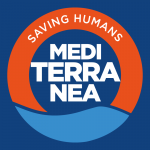On 14 June 2021, after being rescued by the merchant vessel Vos Triton in international waters, about 170 people were handed over to the so-called Libyan coastguard and returned to Libya in what can be called a ‘pushback by proxy’. The survivors, who had decided to risk their lives to escape Libya, should have been brought to a Place of Safety as is prescribed by international maritime law. Instead, they were placed in detention upon arrival in Libya, a country which is not recognised neither as a safe country, nor as a Place of Safety by the international community, and known to subject detainees to systematic forms of intentional violence, including sexual violence such as rape and torture. Only a week after this forced return to Libya, the organisation MSF decided to withdraw their operations in two detentions centres in Tripoli, due to the unacceptable forms of violence detainees are subjected to.
Whilst every month thousands of people are forcibly captured at sea and returned to these violent conditions, this case is particularly alarming because of the involvement of a merchant vessel, the Vos Triton, owned by the Dutch company Vroon, whose Italian office is responsible for the ship, and flying the Gibraltar flag. This case constitutes yet another illegal pushback to Libya facilitated by a private actor (see a similar event on 2 May 2021). It is yet another violation of international maritime law – because as Libya is not a Place of Safety, the people’s rescue cannot be considered as concluded – human rights and asylum law at Europe’s borders.
We demand an end to these orchestrated human rights violations in the Central Mediterranean Sea and at all European borders, either perpetuated directly by European authorities or by delegation to Libyan authorities or private companies. We demand a re-establishment of the currently non-existent state rescue program to Europe. We also demand an end to this violent border regime that forces people to risk their lives to reach safety, in favour of the right to escape safely and of freedom of movement for all.
What follows is a brief summary of the case, followed by a more detailed timeline of the events that led to the pushback.
CASE SUMMARY
The approximately 170 people on board the overcrowded wooden boat called Alarm Phone when they were in distress in international waters. They were drifting with a broken engine just 6 nautical miles off the Maltese Search and Rescue zone. Despite repeated emails and calls by the Alarm Phone to all authorities, ten hours after the first alert, no state rescue asset had intervened yet. Instead, the merchant vessel Vos Triton was sent to the boat in distress. Sea-Watch’s civilian reconnaissance aircraft Seabird arrived on the scene at around the same time and could observe several people from the overcrowded boat jumping into the water to reach the Vos Triton by swimming. Eventually, after about an hour, the merchant vessel had managed to take all the people from the wooden boat aboard and headed south.
At 18:17 CEST on June 14th – 16 hours after the first call to the Alarm Phone – the civilian aircraft Seabird witnessed how the Vos Triton had stopped next to the so-called Libyan coastguard’s vessel ‘Zawiyah’, with the intention to hand over the rescued people (see detailed timeline below).
Despite several attempts to reach the Vos Triton via radio and despite the many emails and phone calls to the company, the handover took place, as also confirmed and condemned by IOM and UNHCR.
TIMELINE
In the night from Sunday 13th of June to Monday 14th, the Alarm Phone received a call about a boat in distress with approximately 170 people on board (at the time they said they were about 200 people). The wooden boat was drifting in International waters, just 6 nautical miles from the Maltese Search and Rescue (SAR) zone, and the people on board said their engine was broken.
At 02:17 CEST, Alarm Phone received the following position N 34°13.079′ E 011°56.005′, which was relayed to all authorities – Italian, Maltese, Tunisian and Libyan.
At 03:43 CEST, the Alarm Phone reached the Rescue Coordination Centre in Malta (RCC) where an officer took the information and said they would probably investigate and start a rescue operation.
Over the course of the next hours, the people on board the overcrowded boat were calling the Alarm Phone repeatedly. Their situation was serious: They had run out of food and water already the day before and were exhausted from the journey. One person was suffering from a wound, and needed urgent medical attention. The Alarm Phone was told that several women were unwell and “people are dying”. The people on board also said that they did not want to return to Libya, where they said they had been subjected to torture and imprisonment.
At 07:56 CEST, the Alarm Phone reached the Maritime Rescue Coordination Centre in Rome (IMRCC). The Italian officer confirmed that the information and emails about the boat had been received by them, but didn’t say anything about a planned rescue. The so-called Libyan coastguard could not be reached via phone.
Although the authorities, Frontex and the UNHCR, were being updated regularly via email with all the relevant information and most recent GPS positions, after more than 10 hours (!) there was still no coastguard ship on the way. In the early morning, Alarm Phone tried to alert the merchant vessel Maridive 230, which was just a few nautical away, but it did not change its course.
At 11:54 CEST, the office of the Italian ministry of defence responded to pressure by the Alert Network Med saying that an unspecified ‘tug vessel’ was on its way to the target.
About ten hours after all authorities had been alerted with a GPS position of the boat in distress, the merchant vessel Vos Triton, owned and managed by the Italian office of the Dutch shipping company Vroon, had changed its course north and arrived on scene.
At this point the Alarm Phone could no longer reach the people on board, but Sea-Watch’s aircraft Seabird was heading towards the case.
At 13:24 CEST, Seabird spotted the boat alongside the merchant vessel Vos Triton in position N34°12′, E011°55′.
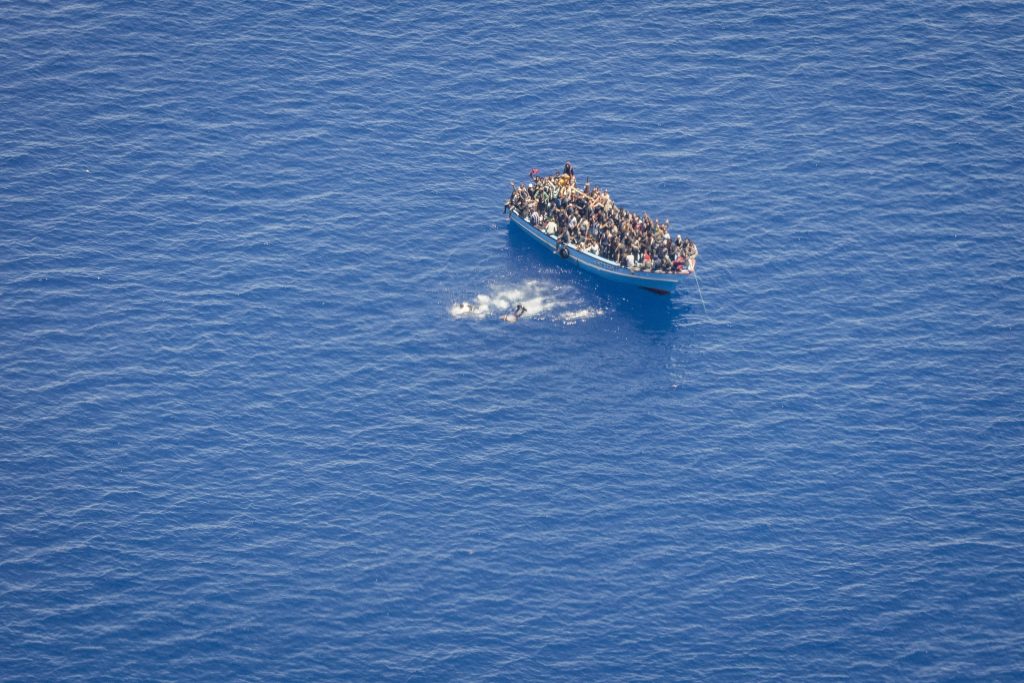 Photo: Sea Watch Mediateam (Sea-Watch e.V.)
Photo: Sea Watch Mediateam (Sea-Watch e.V.)
Seabird could observe that the blue wooden boat with a white stripe on the side was severely overcrowded with approximately 170 people on board and that the people had no life vests.
Some of them had jumped into the water and tried to swim towards the merchant vessel Vos Triton.
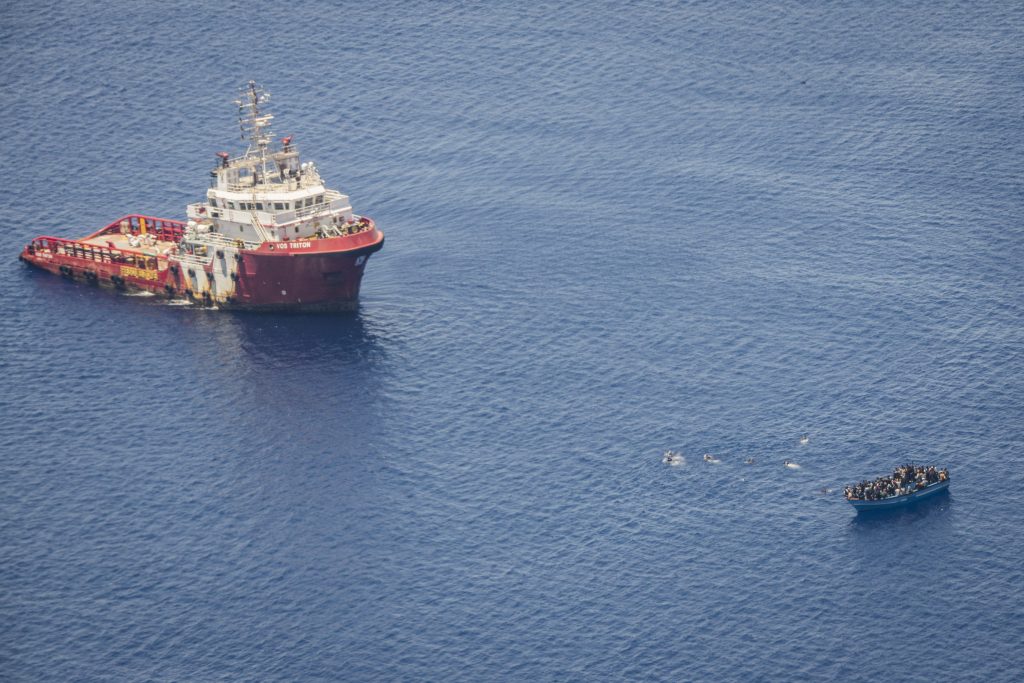 Photo: Sea Watch Mediateam (Sea-Watch e.V.)
Photo: Sea Watch Mediateam (Sea-Watch e.V.)
Seabird’s crew tried to reach the Vos Triton via VHF (radio on board of ships) multiple times, but they never responded.
Luckily, the people in the water managed to reach the vessel and climbed on board, several others were following (up to 8 at a time). Orbiting around the 2 boats for almost 1.5 hours, Seabird’s crew monitored the case closely and could observe how the Vos Triton tried to bring the migrant boat in with a rope.
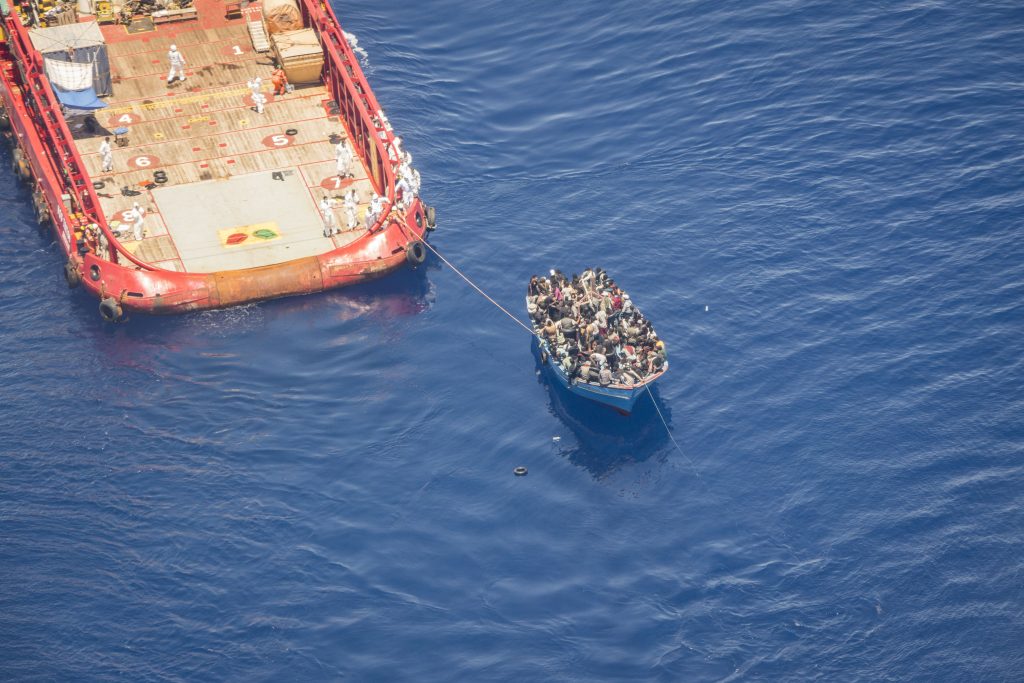 Photo: Sea Watch Mediateam (Sea-Watch e.V.)
Photo: Sea Watch Mediateam (Sea-Watch e.V.) 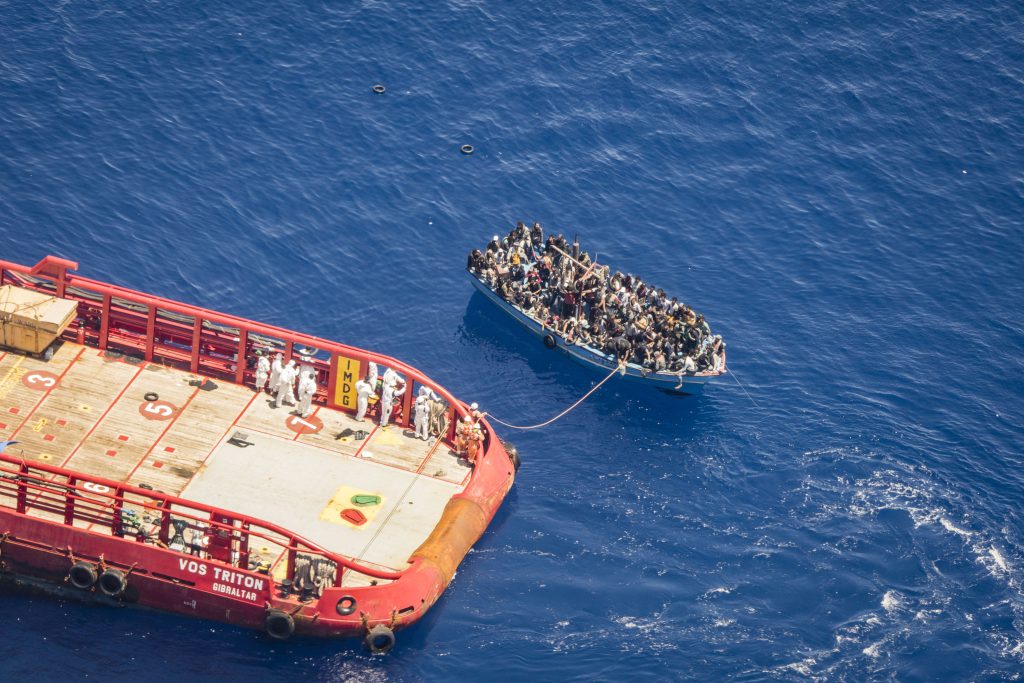 Photo: Sea Watch Mediateam (Sea-Watch e.V.)
Photo: Sea Watch Mediateam (Sea-Watch e.V.)
At 14.35 CEST, more than an hour after its arrival, the Vos Triton finally managed to bring in the boat with a rope and to take the people on board.
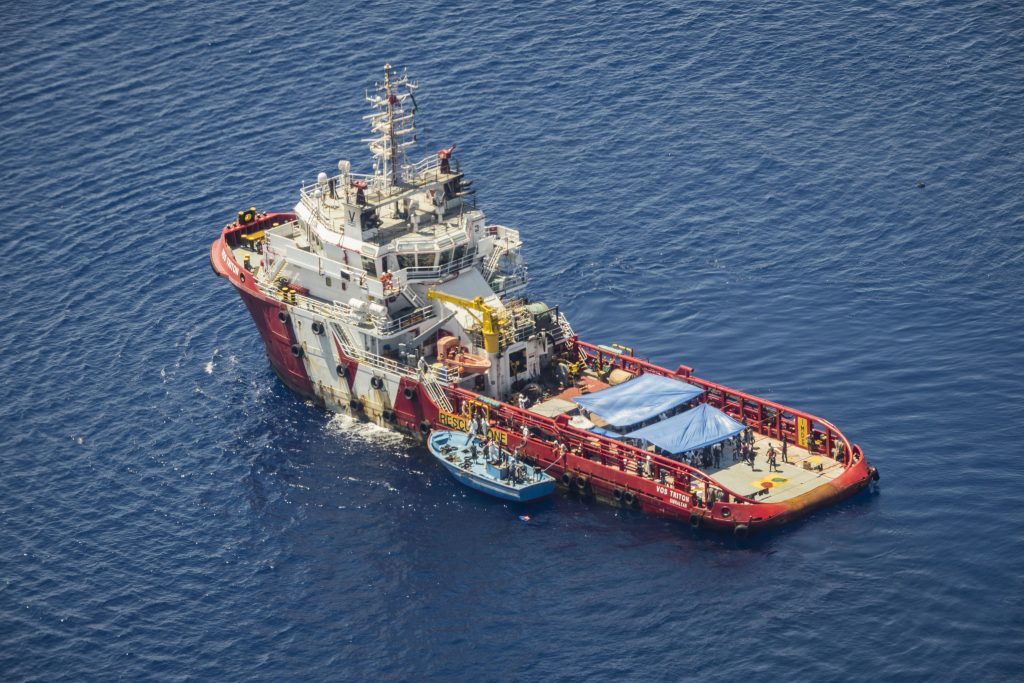 Photo: Sea Watch Mediateam (Sea-Watch e.V.)
Photo: Sea Watch Mediateam (Sea-Watch e.V.)
At 14:45 CEST, the Seabird crew reminded the Vos Triton of their duties, but, as with all the other previous attempts at communication, there was no response. All radio communications were held on channel 16.
For some time, Seabird left the scene and spotted other boats in distress, but returned to the Vos Triton again at a later time.
At 17:40 CEST, the Seabird radio overheard a call to the Vos Triton, saying that the so-called Libyan coastguard’s asset ‘Zawiyah’ was heading there and would arrive in half an hour.
At 18:06 CEST, Seabird overheard on channel 16 the Vos Triton telling Farwah platform that the so-called Libyan coastguard will come on their starboardside and that “all crew is on quarantine in their rooms”.
At 18:17 CEST, the Seabird crew saw the so-called Libyan coastguard vessel 656 ‘Zawiyah’ alongside the Vos Triton.
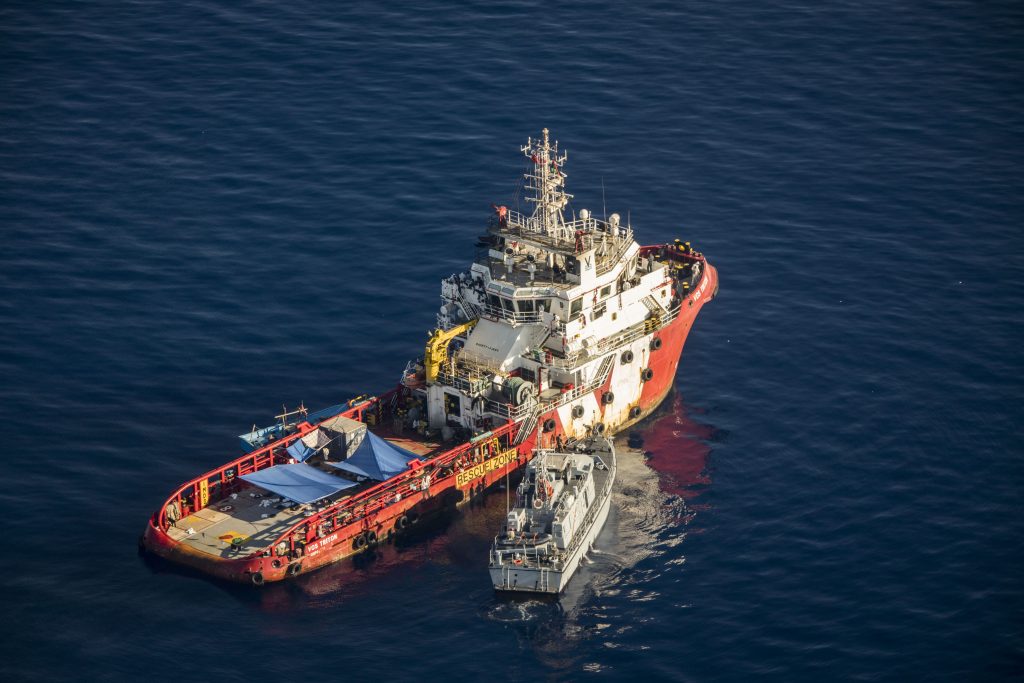 Photo: Sea Watch Mediateam (Sea-Watch e.V.)
Photo: Sea Watch Mediateam (Sea-Watch e.V.)
At this point, it could be assumed that the Vos Triton was preparing a transhipment to the so-called Libyan coastguard. Seabird’s crew tried to call the Vos Triton twice again on Channel 16 without any response. Another attempt to persuade the Vos Triton to refuse to handover the people followed. Again no response. Seabird then had to leave the scene and return to land due to fuel shortage.
We don’t have insights into the details of what happened next, but we know that the people rescued by the Vos Triton were handed over to the so-called Libyan coastguard, disembarked in Tripoli Harbour and put into detention upon arrival, against the will of the survivors and against international law. All Libyan detention centres are known to be places of absolute horror and we fear for the well-being of the 170 people who had risked their lives, almost drowned and died of thirst, only to be illegally returned to the place they had tried to escape from.
Against the normalisation of violations of the maritime, human rights and asylum law, we demand
to all
– The compliance of any operation of search and rescue with the assumption of Libya as a place of unsafety and an unsafe country, which is featured by systematic and intentional violence against people on the move and Libyan citizens. This means people must not be brought back to Libya in any case.
to EU authorities
– The abolition of all the political and juridical tools, which try to legitimise these unacceptable modi operandi, and that only lead to violence and death at the border.
to private actors, such as merchant vessels
– To comply with international maritime law principle and duties and hence, rescue without any delay and ensure a disembarkation in a safe place – which can only be Europe – to not become complicit in illegal pushbacks and human rights violations by agreeing with transhipments to an unsafe country and to not put their economic interests before human rights and human lives.
